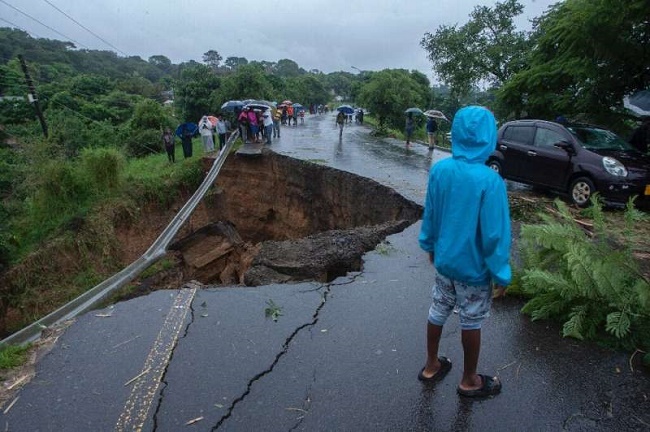Cyclone Freddy, a long-lasting cyclone that is refusing to dissipate, has torn through Malawi and Mozambique killing around 200 people and leaving many others injured or missing.

The storm, which is said to have broken records for its longevity – now 35 days – swept inland from the south-eastern coast of Africa and is causing massive flooding and displacement.
The Department of Disaster Management Affairs in Malawi reported that 85 people had died in Blantyre, the second-largest city in the country, and the flooding and mudslides across the southern region prompted the government to declare a state of disaster in 10 districts.
Schools were closed, flights were cancelled, and rescue workers frantically dug through mud and collapsed buildings in an effort to save lives. Police and aid workers said they anticipated that there would be more found dead and injured.
“The figures might rise because there is a lot of rubble, especially in Blantyre,” said Felix Washoni, spokesman for the Red Cross in Malawi. “There might be some bodies that are buried in the rubble.”
The Mozambique National Institute for Disaster Management said the fallout from the storm’s second landfall in the country was worse than expected.
The storm has raged for 35 days, breaking the record for the longest and most sustained storm in the Southern Hemisphere, according to the U.S. National Oceanic and Atmospheric Administration.
Environmental watchdog, 350Africa.org, says it stands in solidarity with people and partners affected by Cyclone Freddy, which first developed in Australia in February and travelled across the southern Indian ocean.
The longest lasting tropical cyclone on record has left a trail of destruction of infrastructure and property in its wake, after hitting Africa for the second time in a month, on Saturday.
While expressing deep concern for those affected, 350Africa.org notes the vulnerability of African communities to intense and recurrent climate impacts and emphasises the need for increased climate financing to support communities build resilience to the same.
Landry Ninteretse, 350Africa.org Regional Director, said: “As a climate justice organisation, we are concerned about the impact of this tropical cyclone on the affected communities. We express our sympathies to the communities and partners affected by this disaster and call on humanitarian agencies to move with speed to save lives. Needless to say, disasters such as these are further evidence of the injustice suffered by the nations that contribute least to the climate crisis, as they bear the brunt of the crisis, by way of worsening climate impacts.
“This situation calls for the world’s biggest polluters like TotalEnergies to commit to significantly lowering their greenhouse gas emissions by moving away from fossil fuels like the Mozambique LNG project, as well as for the wealthy nations and development finance institutions such as the African Development Bank (AfDB) to deliver climate finance to help the most affected build resilience to impacts of the climate crisis.”
Dr Johan Stander, World Meteorological Organisation (WMO) Services Director, said: “Freddy is having a major socio-economic and humanitarian impact on affected communities. The death toll has been limited by accurate forecasts and early warnings, and coordinated disaster risk reduction action on the ground – although even one casualty is one too many.
“This once again underlines the importance of the UN Early Warnings for All initiative to ensure that everyone is protected in the next five years. WMO is committed to working with our partners to achieve this and tackle extreme weather and climate change related risks – one of the biggest challenges of our times.”
Advance warnings of the storm by WMO’s Regional Specialised Meteorological Centre La Réunion (Meteo-France) and by the national meteorological and hydrological services of Madagascar, Mozambique and Malawi reportedly allowed the disaster management and humanitarian communities to mobilise in advance, with evacuations and pre-positioning of food supplies.
The last cyclones to cross the entire southern Indian Ocean were Leon-Eline and Hudah in 2000.
